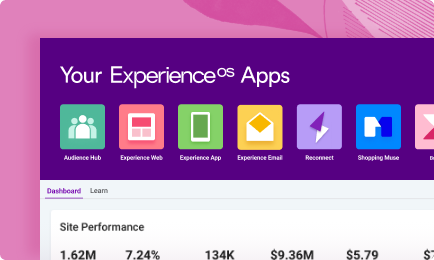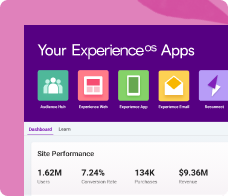Apple Mail Privacy Protection, a welcomed milestone in Responsible Personalization
Learn about updates discussed during Apple’s Worldwide Developers Conference and why Dynamic Yield's personalization capabilities will not be impacted by any of the new limitations imposed by Apple's new "Mail Privacy Protection" features.
On June 7th, Apple announced “Mail Privacy Protection” features for its Mail app that are expected to roll out sometime between September and November of 2021. In essence, an enhanced privacy mode will limit the tracking capabilities of invisible pixels, which are mostly used by 3rd party vendors to collect behavioral and demographic data about the user who opens the email.
In this post, I’ll dive into the updates discussed during Apple’s Worldwide Developers Conference (WWDC). I’ll also touch on how Dynamic Yield has built its personalization capabilities with user privacy in mind, and as a result, will not be impacted by the change.
How will Apple’s Mail Privacy Protection work?
First and foremost, it’s important to remember that Apple has not published any official technical documentation at this point in time. Therefore, we don’t know for sure how Apple plans to fight these pixels or differentiate between them and regular images.
However, based on the information provided, we can estimate the following:
Apple will encourage its native Mail app users to turn on the enhanced privacy mode through a one-click activation that provides two options: “Protect Mail Activity,” or “Don’t “Protect Mail Activity,” making it very easy to say yes and thus increasing the likelihood of adoption.

Once enabled, Apple will load all emails in their servers before the user opens them. This means tracking the user’s location or IP address via invisible pixels is no longer possible. Instead, the IP address of Apple’s servers is to be shown, rendering impressions as obsolete seeing as all emails will be opened by Apple servers.

What does it mean for the email marketing industry?
Apple’s latest privacy move is expected to affect the entire market. In fact, around half of all email users have an active Apple Mail app on at least one of their devices. But to make things more complicated, the changes will also affect users that have the Mail app in one of their devices, even if it’s not the device they usually read emails with.

Source: Litmus – Email Client Market Share as of July 1, 2021
(Based on Email Opens)
Given that ALL emails will be opened by an Apple server, many of the services email marketers have come to rely on may cease to function, including:
- Open Rate – One of the main metrics currently used to measure email performance will become over-inflated and lose its meaning
- Opens as a Trigger – Orchestrated journeys can no longer use an email open as a trigger for the next email or experience
- Location Data – As tracking pixels will not have access to the user’s IP, this data will become less accurate in analytics
- Map Widgets – Similarly, showing the closest brick-and-mortar store to the user’s location will no longer work without an IP address
And many more applications that rely on tracking the user’s IP or email open behavior.
From serving personalized content to analytics, the industry must adapt to these changes – Apple has a track record of swaying the industry to align with its standards, similar to how Chrome is catching up to Safari’s ITP.
Dynamic Yield’s Responsible Personalization doesn’t mean Privacy has to be compromised
Personalization requires user data and some marketing platforms aim to gather as much of it as possible, blurring the boundaries of personalization and privacy.
At Dynamic Yield, we hold ourselves to the highest set of privacy standards, which we refer to as Responsible Personalization, to ensure everything we do happens within safe boundaries. Our entire platform was built to abide by these core principles, including our email personalization capabilities.
It is because of this that the Dynamic Yield platform does not behave in the way Apple seeks to prevent – more on that below.
You control how Dynamic Yield identifies your subscribers
The main crux of Apple’s Mail Privacy Protection is to eliminate the usage of invisible pixels and IP addresses, two methods Dynamic Yield does not use to personalize email content or infer user identity
Dynamic Yield relies on explicit identifiers, which you – as the brand owner – choose. Determining the right identifier is critical, as brands should view privacy in a holistic manner rather than a vendor-driven decision.
For example, some brands opt for hashed emails while others, Customer ID. Both ensure that the user identity is protected in email campaigns, and even if you choose to identify using an un-hashed email address, the platform architecture ensures the rest of the user data remains protected.

When embedding a Recommendation or Dynamic Content blocks, you explicitly state the distinguisher ID as a parameter to the image and link tags, in this case – hashed email
Given Dynamic Yield’s Responsible Personalization practices have the right safeguards in place, Apple’s Mail Privacy Protection is therefore redundant, with content remaining personalized for users regardless of the platform they use to open their emails.
There’s no need to panic
Apple is helping consumers fight invasive privacy tactics and their recent announcement is expected to represent another milestone in web privacy. Much like GDPR and the depreciation of 3rd party cookies, it is a part of the constant evolution that is marketing, which should not be feared but embraced.
With privacy as a core principle, Dynamic Yield welcomes these changes, which we do not expect to limit our capabilities in any way.















